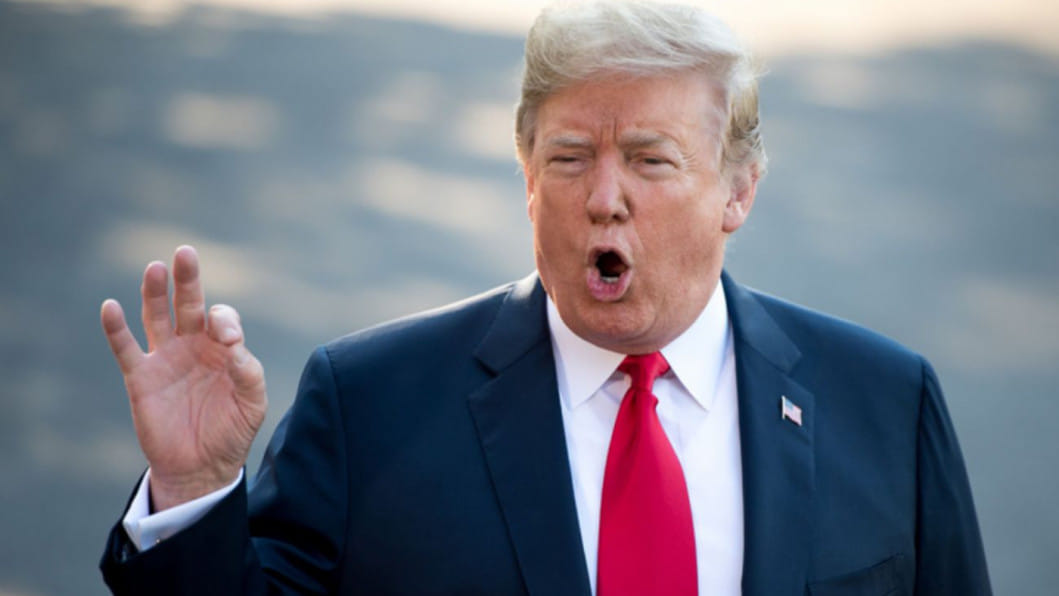Impeaching Trump: ‘To be or not to be?’

The opening phrase of a soliloquy uttered by Prince Hamlet in Act 3, Scene 1 of the play Hamlet—"To be or not to be?"—was about life and death, not about politics; yet perhaps this aptly captures the current US political scene. Facing a decision of great significance, the Democratic Party leaders of the House of Representatives seem to be in the same quandary.
The question is about commencing impeachment proceedings in the House of Representatives against President Donald Trump. The media pundits are asking the question in various ways: will they do it? Although some Democrats have been suggesting this for a long time, it got more attention in April after Mueller's report was made public. But since the press conference of Robert S Mueller III on Wednesday, the issue of impeachment is now front and centre. Once considered a political taboo, it is now a topic nobody can avoid.
Mueller's press conference was the last act of his almost two-year stint as the special counsel appointed by the Department of Justice to investigate Russian interference in the 2016 election, and possible obstruction of justice by President Trump. Much has happened leading to and after the appointment of Robert Mueller as the special counsel. The 448-page, two-volume report has become an issue of intense discussion, particularly after an initial two-page summary was released by Attorney General William Barr. The summary, as it became evident after the redacted report was released, was far from an exoneration of Trump. Trump, however, continues to claim that he has been exonerated based on Barr's summary. Mueller, on the other hand, said in his press statement on Wednesday that if he and his team "had confidence that the president clearly did not commit a crime, we would have said so." The report has shown in detail that there were "multiple, systematic efforts" by the Russians to influence the election.
The political question, therefore, is whether impeachment is a pragmatic and prudent move, especially before the 2020 election. Previous instances of a failed attempt to remove the president had bolstered the incumbent.
The question, which has assumed significance, is whether President Trump should be held accountable for "obstruction of justice". Mueller reminded everyone that he was bound by the Department of Justice policy which is "Charging the president with a crime was…not an option." But he said, "The Constitution requires a process other than the criminal justice system to formally accuse a sitting president of wrongdoing." This is what added urgency and weight to the debate on impeachment. This is as clearly as Mueller could say that the Congress can now proceed to hold the president accountable; in other words, Congress can start the impeachment proceedings.
Impeachment, in short, is a multi-step process: the process commences when the House of Representatives votes instructing the Judiciary Committee to determine whether there are sufficient grounds for Congress to impeach the president. The second step is when the committee, after holding an inquiry including a public hearing and gathering information, writes the articles of impeachment (that is the specific charges against the accused), and votes on whether to send them to the full House for consideration. The third step is a vote in the House on the articles of impeachment, which are then sent to the Senate. The fourth step is holding the trial itself in the Senate with the chief justice presiding. The final step is the conviction which requires two-thirds of Senators' support. Conviction, in this instance, means "removal from the office and disqualification to hold or enjoy any Office of honor."
Procedurally speaking, the Democrats can easily get through four steps as it has the majority in the House, but the Republican-controlled Senate is unlikely to convict President Trump. Of the required 67 votes, Democrats have only 47 of their own. There is no guarantee that all Democrats will be willing to vote for a conviction; on top of it all, 20 Republicans breaking ranks is wishful thinking at its best.
Impeachment was one of the issues dividing the candidates seeking the 2020 Democratic Party presidential nomination until Wednesday. Now, almost all of them have lent their support for such a process, and there is a growing chorus among progressive liberal House members to initiate the proceedings. Many are suggesting that it is not an option, but an imperative. Speaker of the House Nancy Pelosi is yet to entertain the idea, although she has said, "Nothing is off the table."
Notwithstanding the difficulty of securing the required votes to remove the president, the most important question is whether an impeachment proceeding would be helpful for the Democrats in the 2020 election. The dilemma that the Democrats are facing is between their constitutional duty and moral standing on the one hand, and the potential political fallout from a failed attempt to remove Trump from office, on the other. The moral argument is simple: no one is above the law and anyone transgressing the law must be held accountable. This is even more important in the Trump era where the president's behaviour and actions are an afront to any kind of checks and balances. The ego-driven authoritarian bent of the US president calls for an appropriate response from the legislative branch.
The Mueller report contains several instances where the president had attempted to obstruct investigations, albeit unsuccessfully, because, in most cases, his staff defied his instructions. Whether these attempts are enough to prosecute him is a legal matter, but impeachment is more a political matter than a legal one.
The political question, therefore, is whether impeachment is a pragmatic and prudent move, especially before the 2020 election. Previous instances of a failed attempt to remove the president had bolstered the incumbent. Although the impeachment of President Clinton is not comparable to the current situation, we can't ignore the fact that Clinton's approval rating reached a high of 73 percent after impeachment; the Republicans lost House and Speaker Newt Gingrich's political life ended. In the 2020 election, the odds are not against Trump: incumbency and the economy favour him. Incumbents tend to win elections. Nineteen presidents have sought re-election since 1900; of those, 14 have won and five have lost. That includes Gerald Ford, who wasn't elected in the first place. Since WWII, only three have lost their re-election bids. With the economy doing well and the unemployment rate going down, presidents win. Forecasting models, which predicted the victory of Trump in 2016 based on economic growth, point to a Trump re-election in 2020. Additionally, despite low approval ratings of President Trump, which have hovered around the low 40s throughout the last few years, his support base has remained intact; there hasn't been any defection. There is yet to be a clear Democratic frontrunner and the crowded field of 24 aspirants is sending a not-so-positive signal to the voters.
There are, of course, some positive indicators for the Democrats: Trump's approval rating, including in the states which Democrats lost to Trump in 2016, is low. But most importantly, Trump is vulnerable on several fronts. As David Von Drehle, in a column in the Washington Post, writes, "[Trump is] heading into his reelection campaign minus the trade deal with China that he promised; minus the big infrastructure program that he promised; minus the Mideast peace that he promised; minus the big, beautiful wall that he promised; minus the money from Mexico that he promised; minus the good, clean government that he promised; minus the balanced budget that he promised; minus the revived coal industry that he promised." If the Democrats focus on impeachment, none of these will be the issue. The healthcare and immigration issues, which delivered the House of Representatives to the Democrats, will be pushed to the backburner. These are signature issues for the Democrats. The push for impeachment might be viewed by some voters as "Democrats going too far", and its failure will help Trump portray himself as a victim and claim he has been "exonerated twice". Trump's recent actions—from a temper tantrum in the meeting with Democratic leaders to provocative tweets to attacks on Mueller to making wild remarks about impeachment—may be less impulsive than they appear. Perhaps they are designed to entice Democrats to the impeachment route.
Should the Democrats take the moral high road and fulfil their constitutional duty or focus on a winning strategy for the 2020 election and deal with these indiscretions later? Impeachment is a high-stakes gamble at this moment, but that does not mean that it should be off the table for good and that the Congress should abdicate its responsibility of holding the president accountable.
Instead, the ongoing investigations in the House, particularly investigations on Trump's tax returns, financial records, and potential violations of the emoluments clause, should continue in full force which will annoy Trump, land him in trouble, and allow the Democrats to make a case to the voters in 2020. Perhaps, the money trail will reveal compelling reasons for an impeachment which the Republicans won't be able to ignore.
Dr Ali Riaz is a distinguished professor of political science at the Illinois State University, USA.
Follow The Daily Star Opinion on Facebook for the latest opinions, commentaries and analyses by experts and professionals.
To contribute your article or letter to The Daily Star Opinion, see our guidelines for submission.

 For all latest news, follow The Daily Star's Google News channel.
For all latest news, follow The Daily Star's Google News channel. 



Comments